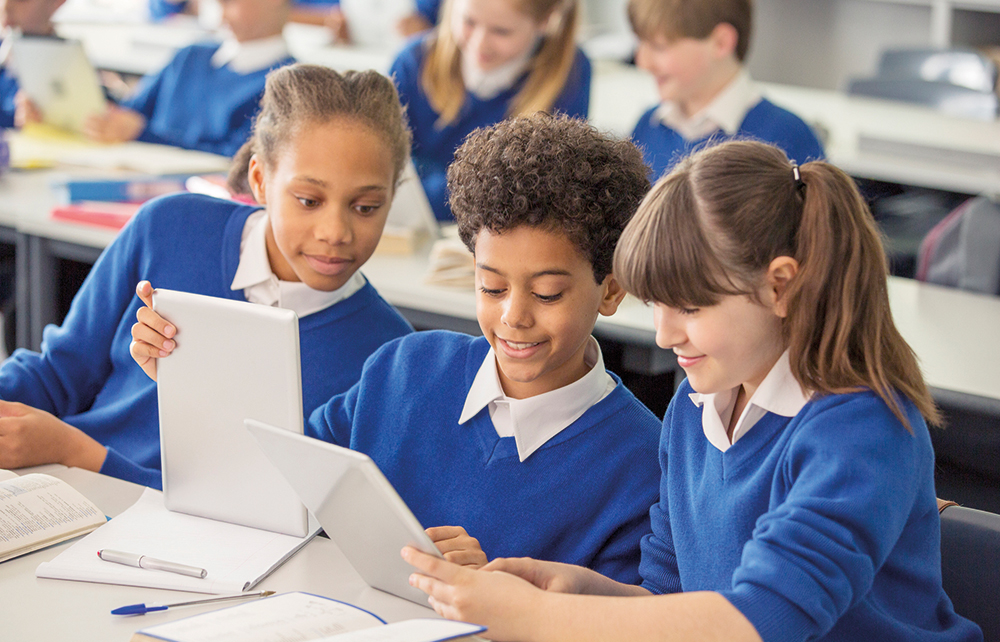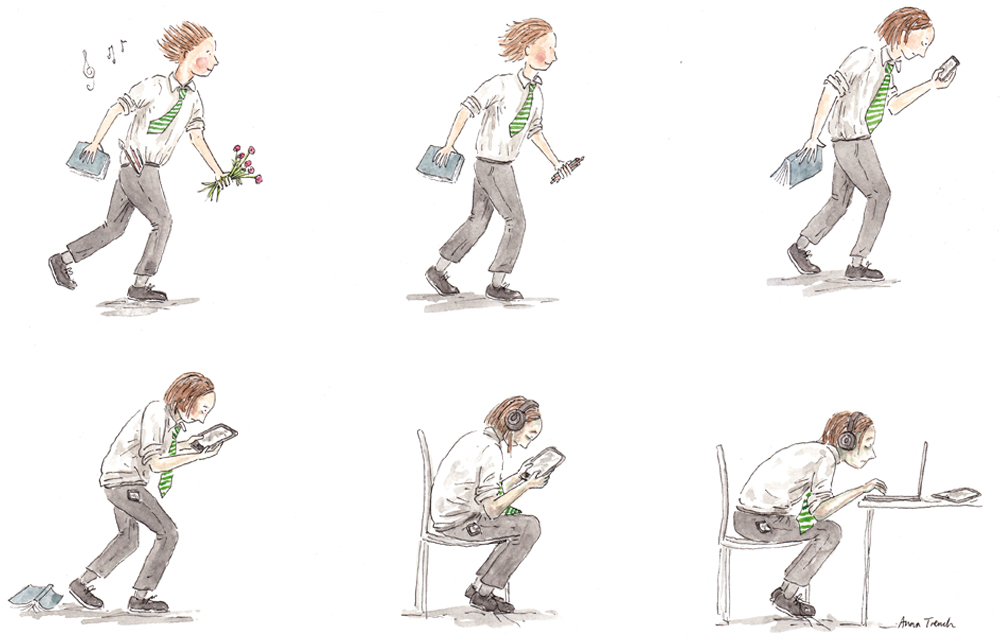It was gratifying to see the recent Unesco report recommending moderation on the topic of tech in the classroom. I do hope the Department for Education, Ofsted and every school head in the country has read it. Britain seems to have submitted to the tidal wave of digital learning without so much as a minnow of doubt. The switch to online lessons during the lockdowns should have been temporary, an emergency measure – not something we then accepted wholesale. Personally, I find the sight of 26 bright faces glued to 26 bright screens for lesson after lesson indefensible. The argument that these platforms are ‘adaptive’ is unpersuasive – a good teacher is adaptive.
Most educational platforms do the heavy lifting while the pupil paddles distractedly in the shallow waters
Multiple teachers have been very candid with me about the failure of tech in the classroom. Rachael G, an assistant principal from a school in Hackney, east London, saw first-hand the damage caused by giving every child an iPad in her previous school. ‘Students would be in lessons but instead of listening to the teacher and processing the learning, they were staring at their iPad,’ she says. ‘It overstimulates the brain, is incredibly addictive to look at and the children became zombie-like. Even the best students with the best intentions would focus on the process of acquiring the facts rather than actually being able to learn them. [The iPad] sought only to stoke their screen addictions and took away from the purest form of teaching: explanation. The goals of digital learning – to be more efficient, to increase independence, to reflect the real world and give students the tools needed when they leave school – largely fail on all accounts.’
Another deputy head who wishes to remain anonymous told me: ‘We tried Century Tech, an artificial intelligence learning platform, and it simply didn’t work: it provided our pupils with the wrong information. They were actually getting worse in certain subjects because they were using it.’ ‘Technology is too often seen as a panacea: a quick, expensive solution to a number of issues, including children being disengaged in class,’ says David James, deputy head at Lady Eleanor Holles School in south-west London. ‘The most powerful learning tool in the classroom is an excellent teacher, and the most effective way of ensuring that children progress is to teach them to read and write effectively. But a screen is a distraction, an obstacle to learning, in a way which a book, a page and a pen never are.’
For my part, in schools I’ve visited where tech is used in serious moderation as opposed to trigger-happy abandon, the children are visibly more engaged, focused, happier and capable of sustained discussion.
A trip to Katharine Birbalsingh’s Michaela Community School in Wembley, north-west London, is a genuinely thrilling experience. The children are discouraged from using devices, both in and out of school, the lessons are taught by impassioned teachers who engage the children with constant questions, quizzing them dynamically and regularly on the facts and figures in every subject. They are some of the most engaged, hardworking and intellectually hungry children I’ve been lucky enough to meet.

Offering a different – but no less magical – vibe is the non-selective independent Heritage School in Cambridge for four- to 16-year-olds. Started by Jason and Fiona Fletcher in a little townhouse off Trumpington Street, the pupils go on nature walks each morning, draw their bounty afterwards while listening to classical music, then begin a day of gentle but deeply rigorous screen-free lessons in the hands of wonderful teachers. The bar is raised high, and all the children reach it. As often with the best schools, it’s not ‘shiny’(there are no gleaming IT suites, tennis courts and theatres); just a deeply thoughtful space created by passionate teachers with a vision. The pupils are calm, happy, reflective and eager for knowledge.
The children at both these schools are free from modern distractions and achieve stellar exam results.
I have learned from observation and anecdotally from teachers that most educational platforms do the heavy lifting while the pupil paddles distractedly in the shallow waters. They are rewarded with a dopamine hit of an on-screen cake exploding into balloons (primary school) or a robotic exclamation of ‘great job!!’ (older children) when something very minor is achieved. The student’s mind then comes to rely on digital approbation every time they get something right. Not a healthy pattern to fall into.
As Dr Cristina Koppel, a neurology specialist at Imperial College, explains, the brain is a muscle which needs to stay fit with sustained focus and deep thought; online learning encourages a short-circuiting which damages sustained focus and renders it flabby, needy, twitchy and easily distracted. Reading a book in contrast to all the praise and stimulation from a tablet feels like a leaden, demanding and deeply unattractive exercise.
The fact AI will soon outperform humans in pretty much everything means that schools should move away from the neurological junk food of digital learning and teach their pupils the art of reading, concentration, eloquent discussion, empathy, deep thought and creative expression. Digital learning is anathema to these skills: being so quick and easy may make it superficially engaging, but the learning stays superficial and the focus splinters and frays.
To start the anti-screen revolution, parents have got to learn that heavy digital provision will not fast-track their child straight into Google DeepMind. In fact, it will probably fast-track him into ADD, insomnia and obesity.
The fact that Mark Zuckerberg himself went to the tech-free Phillips Exeter Academy in Boston and that schools such as the screen-free Waldorf School are proliferating all over Silicon Valley point to the urgent need to question the contagion of tech in the British classroom. View the head who proudly tells you that every child will get a Chromebook with wariness, not unquestioning acclaim – shouldn’t all that money have been spent on great teachers and teaching assistants?
For those parents still worried their child will be ‘left behind’ if they’re not gazing at a screen for most of the school day, it’s worth remembering that iPads, tablets and smartphones are ingeniously designed to be understood very quickly – whether by a two-year-old or an 80-year-old. We’ve now moved from digital literacy into gruesome digital dependency and addiction. Children should be protected from this addiction in the classroom; in fact it should be the final safe space as parents, including myself, lose the battle at home.
Parents shouldn’t accept the excuse from primary schools that pupils need to be online for hours a day to prepare for the Eleven Plus – you can prepare for the computerised part of the exam in just two hours a week. A couple of questions: why is the Consortium Eleven Plus on the online platform Atom Learning? Why are state grammar school children assessed online? If it helps dyslexic children, that’s great, but surely the majority of ten-year-olds taking the Eleven Plus should be writing by hand?

Has some kind of financial deal been struck with the DfE and these digital platforms? Why does Ofsted downgrade primary schools if there isn’t enough tech infused into the daily routine? Surely the opposite should be happening, considering that motor skills such as handwriting and reciting aloud have been proven again and again to implant information more profoundly in the cerebral cortex than clicking on a screen? These questions need to asked, loudly and repeatedly.
And while we’re here – surely it’s time for social media to be made illegal for the under-16s. It may make billions for the tech industry, but the repeatedly proven damage it does to children is indefensible. Jon Haidt and Jean Twenge have forensically demonstrated the mirror symmetry between smartphone use and teen malfunction – but put simply, TikTok is a brain liquidiser, Instagram a self-loathing factory, Snapchat a petri dish of OCD, ADD and addiction, and even the innocent-seeming WhatsApp a trench of bullying. In short, any place where the herd can stampede is a danger zone – and the sooner our children are rid of it, the better.
View the head who tells you every child will get a Chromebook with wariness, not unquestioning acclaim
Our liberal society instinctively panics about banning something. Fair enough, but this is different. This is a child welfare issue, not a political one. We don’t let children smoke or drink – social media is the mental equivalent of these physical toxins.
Many worried parents are starting laudable movements – Teched Off, UsForThem, Wait Until 8th – but until there is government intervention these groups will be limited in effectiveness, as parents inevitably cave to their child’s natural and understandable need to fit in with the majority of their peers. We should also follow France’s example and introduce proper bans to porn sites for the under-18s. How many more examples of teen sexual violence, trauma and lifelong malfunction do we need before we act? If France can do it, so can we.
The attitude of ‘the train’s left the station’, ‘the genie’s out of the bottle’, is frustrating and pathetic. A few great minds could come up with a solution extremely swiftly – as they did in France.
As Juliet Samuel wrote recently in the Times: ‘What’s needed is a new regulatory regime banning smartphone ownership [and social media] for under-16s. An acceptable alternative could be something like a “tobacco-style regulatory framework”, called for by the campaign group Safe Screens meaning only licensed devices could be sold for child use. Those devices would be stripped down, capable only of phone calls and approved apps such as maps.’
Ideally, they would be so boring they’d barely be used. Not only would our children’s neurological and mental health improve exponentially, but their eyesight would too: opticians confirm that blue light causes significant macular degeneration in developing eyes. A physical harm to add to the sea of emotional ones.
Come on, Britain, let’s lead the way.






Comments